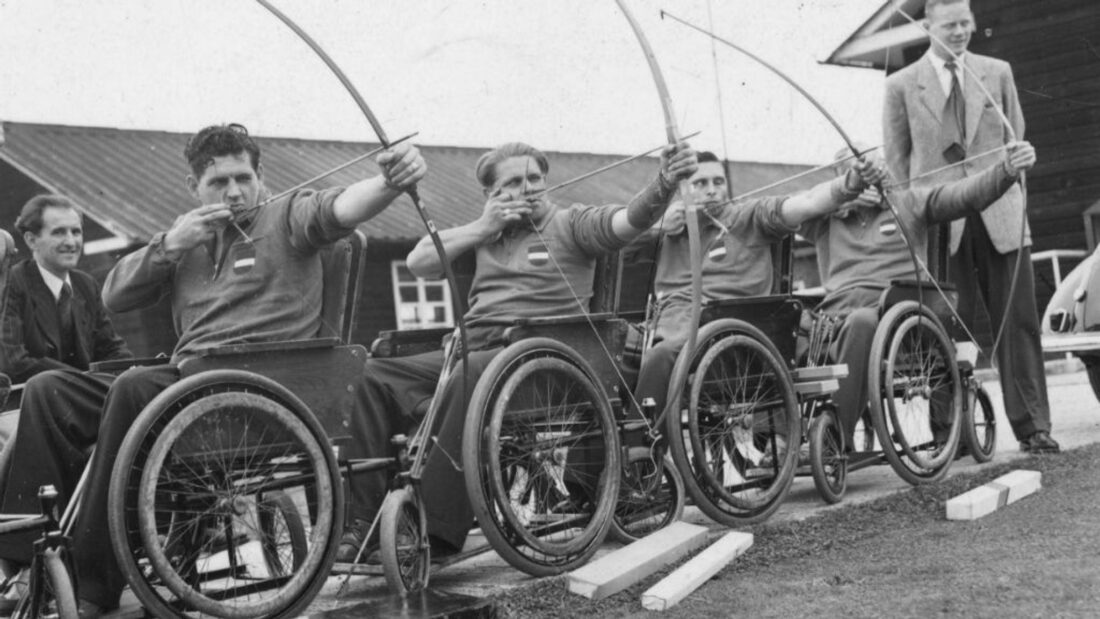On the eve of the Paralympics Games Paris 2024 where more than 4,000 athletes, representing 169 nations, will compete over twelve days for 549 medals across 22 events it is instructing to consider its humble beginnings.
At a hospital for war veterans in Stoke Mandeville, located 60 kilometres north of London, German neurologist Sir Ludwig Guttman was looking for a way to help his paraplegic patients, all World War II veterans, rehabilitate more quickly. His specialised unit was made up of Royal Air Force pilots with spinal cord injuries, who all needed to use wheelchairs. In 1948 Dr Guttman organised sporting events as the Olympic Games took place in London.
Sixteen veterans in wheelchairs faced off in archery and netball competitions, the latter sport already practised by American returning soldiers. It was the beginning of a sporting movement and the largest event worldwide for driving social change.
On Saturday, 30 July 1955, Miss Nancy Scott, a physiotherapist from Brisbane, Australia attended the Fourth International Inter-Spinal Sports Festival at Stokes Mandeville Hospital, the National Spinal Injuries Centre of Great Britain. She reported her experience to the Australian Journal of Physiotherapy.
In the rehabilitation of paraplegics, sport is a major part of the physical programme, and Dr. Guttmann, the Director, believes it so important that he has introduced an annual “Olympic Games” for paraplegics. Eighteen countries were represented, and two hundred and eighty competitors were in wheel-chairs.
The hospital, spaciously situated, consists of long flat buildings connected by concrete paths. On the playing field a dense crowd moved about and, high above our heads, the standards of the nations fluttered in the sun.
Scheduled events were strictly conducted by the staff of doctors, nurses, physiotherapists, and gymnasts. In all the games the fitness of the individual was taken into account. Those with the greater handicap of higher lesions (cervical and upper thoracic) competed alone, but were often skilful enough to enter also against the others with lower lesions. There were two shoots in archery, a longer and a shorter distance” In long lines, men and women shot skilfully, with deceptive ease, for the straight eye and strong shoulder muscles come only from long hours of keen practice.
In table tennis we saw the past year’s champion defeated in a very close match. He was a thin boy whose bat had to be bandaged to his wrist, and who maintained his balance by pressure of his elbow against the chair side. We saw in javelin throwing, too, how grace and strength had been developed by enthusiastic practice. A Scottish boy who held the record previously now threw 56 feet 10 inches and was defeated by a “lower lesion”, a Dutchman who threw 62 feet. The swimming events were held in a beautiful warmed pool. Here the paraplegics swim quite free of apparatus, usually supine, paddling with their arms. Of special interest to us were an Australian woman with a very high lesion, and a boy, about six years of age, who was quick and fearless in the water. I regret that I did not see the fencing, snooker, or archery darts.
The final of the netball match was played off amid great excitement with shouts of encouragement and sometimes disapproval from the onlookers. The Pan-American Jets (America) defeated the D.O.G.S. (Duchess of Gloucester House, England) in a well-fought battle with many a crash and spill.
A group of patients gave a demonstration of club swinging to music, to show how lost balance and strength may be regained. Children, girls and women, boys and men, all were concentrated to perfect the pattern and rhythm which was the beginning of their training.
For us the “Day” concluded with a spectacular wheel-past of the nations, followed by the distribution of trophies. In coloured shirts to distinguish teams, with international badges and banners, were representatives from Australia, Austria, Belgium, Canada, Denmark, Finland, France, Germany, Israel, Malaya, Malta, the Netherlands, Norway, South Africa, Turkey, the United States of America, Yugoslavia, England, Scotland, and Wales. They received the spontaneous, wholehearted applause of the gathered crowd, which could not but be partly in admiration of their courage. Then we all stood to hear the guest speaker, Brigadier Smyth, who quoted “Bring me my bow of burning gold”, and to watch Dr. Roger Bannister make the presentations.
The contestants were entertained at a party in the hospital that night, before dispersing to their homes next day. The festival had continued for three days, and visiting teams were provlded with accommodation at the hospital in special huts erected for the purpose. Many of them look forward with pleasure from year to year to this reunion. It is their own success. It was an inspiration to all who were present.
In 1956 Sir Ludwig Guttman visited Royal Perth Hospital, and in particular the Paraplegic Unit at the Shenton Park Annex. The same Annex that housed the Curtin School of Physiotherapy, where I trained many years later. Guttman inspired the unit’s director, George Bedbrook to bring organised sport for people with disabilities to Australia.
Bedbrook led Australia’s first team for athletes with a disability to the 1957 Stoke Mandeville Games in England. Three years later he facilitated the attendance of the Australian Paralympic Tam at the first Paralympic Games in Rome, Italy, And two years later Bedbrook was the primary organiser when Perth hosted the first Commonwealth Paraplegic Games.
References
Scott, NH. (1956). Fourth International Inter-Spinal Sports Festival at Stokes Mandeville Hospital. Australian Journal of Physiotherapy, 2(1), 34-25.

